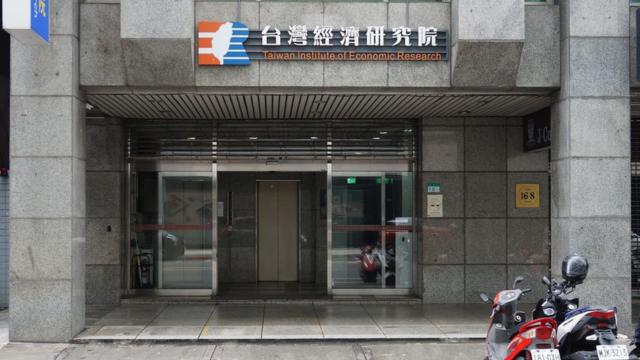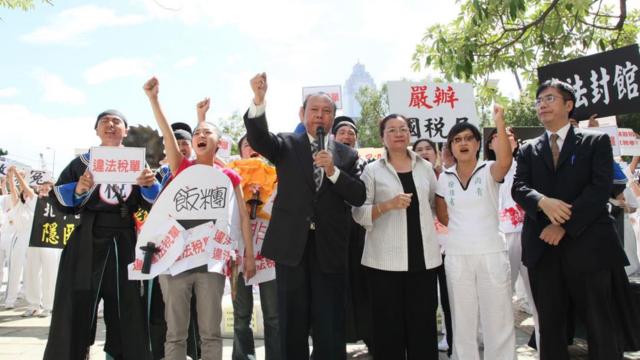Taiwan’s economic development finds an obstacle in its idiosyncratic tax system, which also affected spiritual movements, including Tai Ji Men.
by Juselia S.F. Lin*
*A paper presented at the 5th Annual Meeting of East Asian Society for the Scientific Study of Religion (EASSR) “Religion and Science in the Global East in Context of the Fourth Industrial Revolution,” held online on July 11–13, 2023.

I have served as the team leader and advisor of the Taiwan Institute of Economic Research, specializing in macroeconomics and international investment environment research. As a professional economic researcher, I hope to offer reliable research analysis and recommendations to the Taiwan government based on the study of the global economic situation, and to help Taiwan’s economic development.
Taiwan is an island country with a developed high-tech industry. However, in the era of the fourth industrial revolution, Taiwan’s investment environment has been affected by some government officials who impose arbitrary taxes and seek the bonuses promised to tax bureaucrats who enforce bills, as well as by the lack of transparency and fairness in the tax system. These phenomena have led to low investment willingness and low-wage environment, resulting in a vicious cycle of brain drain of high-tech talents. Taiwan’s technological economic growth faces the challenge of lacking spiritual development as a basis for infrastructure.
In the first part of my paper, I will discuss some systemic problems of Taiwan’s development and tax system. In the second, I will explain how tax injustice can also affect spiritual movements. In the third, I will argue that a spiritual approach to social life grounded on conscience may help solving the problems presented in the first part.
I.
Since 2020, the world has been affected by the pandemic, as well as by geopolitical factors, leading to trade protectionism by various countries, and a poor global economic outlook. Taiwan has a shallow-dish economic model, which is easily affected by the international economy. When the international economy becomes turbulent, it will inevitably, if gradually, affect Taiwan’s economic situation. The World Bank released a global economic growth rate of 3.1% for 2022, but at the same time Taiwan’s economic growth rate for 2022 is the lowest since 2017. The Taiwan’s Directorate General of Budget, Accounting and Statistics estimated that it would be lower than 3% and come to 2.43%.
However, this year Taiwan’s Ministry of Finance announced that Taiwan’s total tax revenue for 2022 was 3.2479 trillion NT dollars, with a substantial over-collection of 523.7 billion NT dollars, and both the annual tax revenue and over-collection amount set new historical highs. According to the Ministry of Finance, this was mainly due to an alleged huge increase in corporate profits. The income tax revenue for 2022 was 1.272 trillion NT dollars, breaking the trillion NT dollars mark for the first time, and the over-collection amount reached 297.2 billion NT dollars. In addition, the business tax also over-collected 91.2 billion NT dollars.
It is very contradictory that Taiwan’s economic growth rate was revised down last year, but the Ministry of Finance said that corporate profits increased significantly and that it could collect 500 billion NT dollars more than expected. From the perspective of the Ministry of Finance, it is a great achievement and a success, but it also hides a crisis for Taiwan’s overall economic development. Firstly, Taiwan’s tax system is unsatisfactory, leading to industrial relocation, Taiwanese businesses increasing their production overseas, and low foreign investment willingness. Secondly, the industrial added value cannot be improved, resulting in low industrial profit margins, and domestic wage levels cannot be increased as a result. Therefore, many professionals move abroad, causing Taiwan’s proud soft power to indirectly promote the economic development of other countries instead.

How to promote Taiwan’s technological and economic development? While I believe the elevation of the mind with love and conscience to be the best solution, here are three practical suggestions for Taiwan government to consider:
1.Attracting more Taiwanese businesses and foreign investments to Taiwan to revitalize the investment environment in Taiwan. Due to the presence of a bonus system, it is easy for officials from the Taiwan National Taxation Bureau to negotiate with businesses to pay more taxes than they should. This phenomenon undermines the mutual trust between the government and the people, resulting in an unfavorable investment environment in Taiwan. As a result, people prefer to choose overseas production. Since 2010, Taiwan’s overseas production ratio has consistently remained above 50%, even exceeding 55% at one point. Recently, due to the surge in international raw material prices, the domestic production ratio has increased but still hovers around 52%. Therefore, improving the tax environment is necessary to create a favorable investment environment and increase the domestic production ratio of Taiwanese businesses.
In addition, there are many policies in place to attract foreign investment to Taiwan, and Taiwan also has some investment incentives. However, why are the results not satisfactory? The transparency and soundness of the tax system are crucial. Throughout history, events such as the French Revolution, the American War of Independence, the British “poll tax,” and the French “fuel tax” have sparked riots and backlash. This demonstrates that foreign investors attach great importance to the tax system.
I have a foreign friend who is interested in investing in Taiwan. However, he heard that four Hong Kong businesses, including Hang Ten, were once subjected to a Taiwan National Taxation Bureau’s interpretation letter order, which resulted in a requirement to increase taxes and in fines ranging from 33% to 47%. As a result, these foreign companies were forced to lay off employees and shut down in Taiwan. In 2011, Taiwanese courts ruled that the penalties imposed by the National Taxation Bureau were excessively harsh and violated the Constitution, leading to the three Hong Kong foreign companies successfully reclaiming 260 million NT dollars.
As a result, my foreign friend developed a sense of mistrust towards the Taiwanese government, leading to a decline in investment willingness. Therefore, if the government is truly committed to attract foreign investment to Taiwan, it must first improve the intangible tax environment in our country. This includes abolishing the bonus system and enhancing the government’s mechanisms to refund tax unjustly imposed and punish corruption. Only by doing so can we attract more foreign capital to Taiwan.
2.Increasing the added value of industries to raise profit margins will naturally lead to an increase in the wage levels of the domestic workforce. A country’s economic strength can be gauged by its Gross National Income (GNI) per capita, which represents the average income of its citizens. According to World Bank data, Singapore’s GNI per capita has consistently remained more than double that of Taiwan. This fact raises questions as to why a country with limited natural resources can achieve an income level that is more than twice that of Taiwan. Consequently, many young people are leaving Taiwan to seek better opportunities abroad due to the low salary environment in Taiwan.
As Taiwan relies heavily on the manufacturing industry, acquiring intellectual property rights to increase industrial added value becomes particularly important. According to data from the Taiwan Intellectual Property Office of the Ministry of Economic Affairs, the number of invention patent applications in Taiwan has declined from over 51,000 filings in 2012 to just over 49,000 in 2021. This decline has led to a noticeable decrease in Taiwan’s industrial added value. In contrast, China’s patent applications have been steadily increasing, from over 652,000 cases in 2012 to over 1,585,000 cases in 2021. This is mainly due to early government subsidies provided to companies in China for patent applications, aiming at enhancing the country’s industrial added value.
Therefore, it is recommended that the Taiwanese government focuses more on assisting businesses in obtaining intellectual property rights as part of its economic development policies. This approach will help increase the overall industrial added value and profit margins, thus raising the wage levels of the population.

3.Government officials with rightness and a sense of conscience can create a taxation environment that is fair and impartial. The lack of a punishment system for Taiwan government officials’ wrongdoings, coupled with the incentives of the bonus system, allows Taiwan officials to continue making mistakes without the need for improvement when it is demonstrated that some of them acted without integrity. Additionally, the excessive administrative discretion granted to Taiwan officials can lead to the creation of false tax bills and violations of human rights to pursue bonuses. This situation leads to discouraging citizens and lowering their willingness to invest.
II.
I come now to the second theme of my speech, how tax injustice in Taiwan has affected also spiritual movements. The fabricated tax case that hit Tai ji Men, a menpai (similar to a school) of martial arts, self-cultivation and qigong since 1996, stands as one of the most representative and longest-lasting cases of tax injustice in Taiwan, although it is not the only one. The prosecutor who started the case in 1996, Hou Kuan-Jen, argued that Tai Ji Men was a cram school, with the consequence that the gifts given by the dizi (disciples) to their Shifu (Grand Master) were in fact tuition fees and should be taxable as such.
Prosecutor Hou’s key evidence for accusing Tai ji Men of tax evasion was the testimony of the tax collector Shih Yueh-Sheng. However, Shih told the media many years later that Prosecutor Hou asked him to lie about an alleged investigation that in fact Shih had never performed. In the criminal case started by Hou, Taiwan’s Supreme Court declared the Tai Ji Men defendants innocent of all charges, including tax evasion, on July 13, 2007. However, Taiwan’s National Taxation Bureau disregarded the court’s ruling. They repeatedly imposed taxes based on an indictment that had already been invalidated by the court.

Finally, in late 2019, the National Taxation Bureau agreed to correct the tax bills for the years 1991 and 1993 to 1996 to zero in compliance with the Supreme Court decision of 2007. However, it confirmed the tax bill for the year 1992 based on the technical argument that for that year (and for that year only) a final and no longer appealable decision had been rendered against Tai Ji Men. Not only did the tax authorities refuse the logical argument that the decision about the 1992 tax bill was substantially unjust and should have been revised. The National Taxation Bureau enforced it and seized, auctioned off unsuccessfully, and confiscated Tai Ji Men’s land through the Taiwan Administrative Enforcement Agency.
The system of bonuses that the tax and enforcement bureaucrats personally pocketed undoubtedly played a role in their stubbornness in maintaining the unjust 1992 tax bill. The Tai Ji Men case also shows that the tax bureaucrats in Taiwan privilege any technicality that would allow them to impose more taxes over substantial justice—which leads me to the third part of my presentation.
III.
Science is the systematic and empirical investigation of natural phenomena, based on observation, experimentation, and theoretical explanation. The prefix “con” means “with” or “together” in Latin. Therefore, conscience can be understood as science with morality, or science equipped with the ability to distinguish right from wrong. Hence, the advancement of science should be guided by ethical principles that respect human dignity and well-being. Otherwise, it may lead to harmful consequences for society.
Dr. Hong Tao-Tze, the Zhang-men-ren or Shifu (Grand Master) of Tai Ji Men, initiated the “The Era of Conscience Movement” in Taiwan starting from January 1, 2014. Through Dr. Hong’s years of international efforts to promote the movement, the United Nations declared April 5 as the “International Day of Conscience” during the 73rd session of the United Nations General Assembly on July 25, 2019. By designating April 5 as the International Day of Conscience, the United Nations reminded global citizens of the importance of conscience at both the individual and collective levels. It emphasizes the need to initiate change from within to create a world of peace.
The Era of Conscience Movement advocates that “when everyone possesses a conscience, the world will be at peace, and when everyone is joyful, every family will be happy.” Although this statement may seem simple, if all would uphold their conscience and act with a selfless heart, they would be led to considering the well-being of others. When everyone operates with a mindset of benefiting others, it fosters harmonious relationships within families and societies. Moreover, if individuals carry out their work with conscience, especially in the case of public servants who should serve the people, they would prioritize the welfare of the citizens. When formulating government policies, they would consider the interests of the public and ensure transparency in government revenue and expenditure. Even if mistakes are made, the officials would reflect upon them and admit their errors. This would foster trust between the government and the people, creating a peaceful and prosperous national economy.
For over fifty years, Dr. Hong has dedicated himself to promoting a culture of peace with love and conscience worldwide. Together with Tai Ji Men dizi, he has traveled to 101 countries across five continents, spreading these ideas. Among the many events he attended, Dr. Hong was invited more than once by the Marmara Foundation Group in Türkiye to participate in their Eurasian Economic Summits. In 2022, he delivered a speech at the summit, presenting solutions beneficial for global and national economic development. In his speech, Dr. Hong proposed optimizing resources through the application of conscience. He stated, “When conscience exists in people’s hearts and they understand how to make the best use of resources for the benefit of the world and humanity, this development of conscience-based economy can be enjoyed for generations, and it will open opportunities for sustainable human development.”

Indeed, if everyone focuses on conscience, the positive thoughts driven by conscience will prioritize the well-being of all when it comes to resource allocation. This will optimize global resource distribution, preventing wars triggered by resource conflicts and interests. Consequently, it will lead to favorable economic development, eventually fostering a world of sustainable peace.
Although the COVID-19 pandemic has brought risks of disruptions to global industrial supply chains and impacted high-tech industries’ production, this impact has also prompted industries to seek measures such as intelligent production and digitization to lighten the effects of the pandemic. Unexpectedly, this has accelerated the development of high-tech and digital industries. As a result, Taiwan’s high-tech industry has performed remarkably well during the pandemic. Particularly, Taiwan’s semiconductor chip manufacturing industry is highly relied on globally, and its success can be attributed to the excellent pool of high-tech talent nurtured through Taiwan’s education system. However, only if this development is accompanied by a spirit of integrity, love, and conscience, forming a conscience-based high-tech development, there is an opportunity to create a cycle of sustainable economic development that can truly benefit humanity.
Therefore, it is crucial for Taiwanese government officials to prioritize serving the public with a spirit of love and conscience. They should understand the importance of righteousness and prioritizing the welfare of the people. By doing so, the Taiwanese government can earn the trust of the entire nation and unite the strength of the people to combat for economic development. Only then can Taiwan truly construct a high-quality investment environment, attract foreign investment, and increase domestic investment willingness. This will in turn raise the industrial added value and the wage levels of the Taiwanese population, effectively promoting national economic development. Taiwan has the potential to create a new economic miracle again. As an economist who really loves Taiwan, I hope that the Taiwanese government officials will serve the people with love and conscience. We also expect the Taiwanese people to embrace the spirit of love and conscience as the foundation for unity, working together to advance Taiwan’s technological and economic development—and its spiritual development as well.
Source: Bitter Winter

